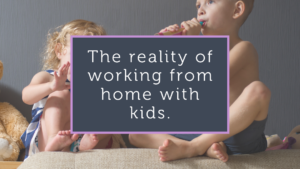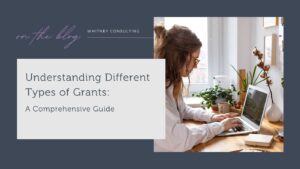Have you ever wondered what sets successful grant proposals apart from the rest? Why do some organisations consistently secure funding, while others struggle to make an impact? While there are many factors at play—such as alignment with a funder’s priorities and a solid understanding of the project—one often-overlooked element can make all the difference: storytelling.
At Whitney Consulting, we understand that grant writing is not just about presenting numbers and facts; it’s about crafting a compelling narrative that connects with funders on a deeper level. In today’s competitive funding landscape, organisations that can tell a powerful story have a distinct advantage. Funders aren’t just looking for projects; they’re looking for stories that inspire, engage, and show the real-world impact of their investment.
In this blog, we’ll explore why storytelling is a crucial element in grant writing, how it can enhance your proposals, and why it’s essential for building strong connections with funders. Whether you’re a seasoned grant writer or new to the field, understanding the art of storytelling can transform your proposals from good to great—and dramatically increase your chances of securing the funding you need.
Watch this: https://www.youtube.com/watch?v=FmFMGupli8g&t=23s
Read: The Future of Grant and Tender Writing in Perth: Trends to Watch in 2025
What is Storytelling in Grant Writing?
Storytelling in grant writing goes beyond simply listing statistics or explaining your organisation’s mission. It’s about weaving a narrative that brings your project to life, demonstrating its importance, and connecting emotionally with funders. When grant writers tell a story, they’re not just asking for money; they’re inviting funders to become part of something meaningful.
Crafting a Narrative that Resonates
At its core, storytelling in grant writing is the art of framing your proposal within a larger, more relatable narrative. Instead of focusing solely on data and objectives, you present your project as part of a journey—one that involves real people, real challenges, and real solutions. It’s about making your organisation’s mission tangible and personal. Through storytelling, you show funders why your project matters, who it helps, and what lasting change it can create.
This narrative approach is especially important when competing for funding, as grant proposals often receive limited attention in a crowded field. By telling a compelling story, grant writers can differentiate their proposals and make them stand out. For example, instead of simply stating that a program will serve 200 people, a grant writer could describe how those 200 individuals are facing specific challenges, how the program will change their lives, and what the ripple effect of that change will be.
Why Storytelling Goes Beyond Facts and Figures
In the world of grant writing, it’s tempting to rely heavily on facts, figures, and budgets to demonstrate the need for funding. While this data is essential, it often fails to capture the heart of the project. Numbers can be powerful, but they don’t always evoke the emotional response that a well-told story can.
A grant proposal that focuses solely on data risks coming across as dry and impersonal. By weaving in storytelling elements, you humanise your project, helping funders see the people behind the numbers. This emotional connection is what ultimately makes your proposal memorable and persuasive.
The Power of Connecting with Funders’ Values
When crafting a grant proposal, it’s essential to understand the values and priorities of the funder. Successful grant writers in Perth—and around the world—know how to align their organisation’s story with the interests and motivations of potential donors or grant-giving bodies. Storytelling provides a unique opportunity to do this, showcasing how your project’s mission complements the funder’s goals.
For example, a funder focused on education might be more inclined to support a project that demonstrates measurable improvements in student outcomes, but telling a compelling story about a student’s personal journey could elevate the impact of the proposal. Whether it’s demonstrating resilience, overcoming adversity, or fostering community connections, storytelling allows grant writers to resonate deeply with a funder’s values and priorities.
Elevating the Proposal with Real-Life Examples
One of the most powerful ways to incorporate storytelling into a grant proposal is by using real-life examples. These could include success stories from past projects, testimonials from individuals who have benefited from your work, or personal anecdotes that showcase the impact of your organisation.
Real-life examples serve as evidence of your ability to execute your proposed project, reinforcing your credibility. They provide context for the data you present and make your proposal feel more authentic. Instead of relying on abstract concepts, you’re showing funders that your organisation has already made a difference, and that with their support, you can achieve even more.
In summary, storytelling in grant writing is not just a tool for adding narrative flair—it’s a powerful strategy that can transform a proposal from a simple request for funds into a compelling invitation for funders to be part of something meaningful. By focusing on the people, challenges, and successes that define your project, you make it not only understandable but also unforgettable.
Read: How to Write Grants That Stand Out to Funders: Expert Tips and Strategies
Read: What Funders Look for in Grant Application
Read: How to Handle Grant Rejections and Improve Future Proposals
Why Storytelling Matters in Grant Writing
Storytelling is more than a creative addition to grant proposals—it is a fundamental element that can significantly enhance the effectiveness of your submission. In a sea of applications, funders are looking for proposals that not only present data but also convey a clear, engaging, and emotionally resonant narrative. Storytelling helps grant writers capture the attention of funders, foster a deeper connection, and increase the chances of securing funding. Here’s why it matters:
Humanising the Proposal
One of the most significant benefits of storytelling in grant writing is its ability to humanise your proposal. Numbers and statistics are critical, but they can feel impersonal and detached. Storytelling helps you connect with funders on a deeper level by illustrating the real-world impact of your project.
When you tell the story of the individuals or communities who will benefit from your work, you bring your project to life. Funders are more likely to feel personally invested when they see that their support will make a tangible difference in people’s lives. A compelling narrative draws them into the story, helping them understand why your project matters not just on a theoretical level, but on a human one.
Creating an Emotional Appeal
Grant proposals that rely solely on facts and figures often fail to engage funders emotionally. While data is important, it’s the emotional appeal of a well-crafted story that resonates with funders. By sharing a narrative that evokes emotion, grant writers can create a sense of urgency, compassion, or even hope around their project.
Storytelling enables grant writers to frame the issue or problem in a way that makes it more relatable. For instance, instead of simply stating that homelessness is a significant problem, a grant writer could tell the story of an individual or family facing homelessness, giving the issue a face and a name. This emotional connection helps funders understand not just the scale of the problem, but also its human cost—and why it needs to be addressed urgently.
Making Your Proposal Memorable
In a competitive landscape where funders review numerous proposals, standing out is crucial. Storytelling is an effective way to ensure that your proposal leaves a lasting impression. People remember stories much better than abstract facts or statistics.
A well-crafted narrative is easier to recall and revisit than a list of numbers or project details. When funders recall your proposal, they’re more likely to remember the personal stories, the challenges, and the outcomes you’ve described, rather than just the data points. This memorability can be the difference between your proposal being remembered or dismissed.
Building Trust and Credibility
Storytelling not only makes your proposal more engaging but also builds trust with potential funders. By sharing success stories or testimonials from past projects, you demonstrate your organisation’s track record and capability. Funders want to know that their investment will be used effectively, and stories of past successes provide concrete proof that your organisation has the experience and expertise to deliver on its promises.
Certified grant writers often emphasise the importance of credibility in their work. A narrative that highlights real-life examples of your organisation’s impact helps build that trust. For instance, including testimonials from beneficiaries or stakeholders who can speak to your work’s effectiveness shows that your organisation is already making a difference, increasing the likelihood that a funder will feel confident in supporting your project.
Aligning with Funders’ Values
Storytelling in grant writing also enables you to better align your proposal with the funder’s values and priorities. Every funder has specific goals they aim to achieve, whether it’s improving education, tackling environmental issues, or supporting health initiatives. Storytelling allows you to demonstrate how your project fits within those goals.
By tailoring your story to reflect the funder’s mission and values, you show that you understand their objectives and are dedicated to creating outcomes that align with their vision. For example, if a funder’s mission is to reduce youth unemployment, your story could focus on how your project provides job training or mentorship to at-risk youth, demonstrating how your work contributes to their overarching goals.
The Power of Storytelling in Securing Funding
Incorporating storytelling into your grant proposals is not just about making them more engaging—it’s about creating a connection with funders that goes beyond the facts. When you can tell a compelling story that illustrates the real-world impact of your project, you invite funders to become part of something larger than just a financial transaction. They become invested in your mission, making them more likely to fund your proposal and support your cause.
At Whitney Consulting, we specialise in helping organisations craft grant proposals that effectively blend data with powerful storytelling, maximising their chances of success. If you’re ready to take your grant writing to the next level, contact us today for expert assistance.
Read: Avoid Common Grant Writing Mistakes
How to Incorporate Storytelling into Your Grant Proposal
Incorporating storytelling into your grant proposal is a strategic way to engage funders and make your project stand out. Here are key steps to effectively weave a compelling narrative throughout your proposal:
Start with a Strong Hook
The opening of your proposal should grab the reader’s attention immediately. A powerful hook—whether it’s an inspiring anecdote, a striking statistic, or a poignant question—sets the tone for the rest of the narrative. Start by introducing the problem you aim to solve, but do so in a way that highlights the human element. Show the real-world implications of the issue.
Weave the Story Throughout the Proposal
Storytelling should be integrated into every section of your grant proposal, not just the introduction. In the needs statement, you can describe the challenge your project aims to address, but also bring in the voices of those directly affected. In the objectives section, instead of listing goals abstractly, frame them as steps in the journey toward solving a problem. This ensures a cohesive narrative that flows through the entire proposal.
Make It Personal
The most powerful stories are personal. Use specific examples to show how your project will directly benefit individuals, families, or communities. Sharing personal experiences or testimonials adds authenticity and builds emotional connections with funders.
Use Data to Support the Story
While storytelling is key, it’s important to back up your narrative with relevant data. Use statistics strategically to enhance the emotional impact of the story, demonstrating the real need for your project while showing its potential for success.
End with a Strong Call to Action
Conclude your proposal by reinforcing the story’s message and inviting funders to be part of the solution. A strong call to action encourages them to see the impact of their investment, making them feel connected to the cause.
Common Mistakes in Grant Writing and How Storytelling Helps Avoid Them
Grant writing can be a challenging process, and even the most experienced grant writers can make mistakes that diminish the effectiveness of their proposals. One of the most common errors is neglecting the power of storytelling, which can lead to proposals that are impersonal, forgettable, or disconnected from the funder’s priorities. Here’s a look at some common mistakes in grant writing and how storytelling can help you avoid them:
1. Dry, Technical Proposals
The Mistake:
Many grant writers focus too heavily on facts, figures, and technical jargon, thinking that data alone will convince funders of the project’s worth. However, a proposal that’s overly technical can quickly become tedious, making it difficult for funders to connect emotionally with the content.
How Storytelling Helps:
Storytelling provides a way to present information in a compelling and engaging manner. Instead of relying solely on data, you can tell a story that explains how the statistics are impacting real people. For example, rather than just listing the number of individuals affected by a particular issue, you can also share a personal story of someone experiencing the problem, making the need for funding more urgent and understandable.
2. Lack of Focus and Clarity
The Mistake:
Grant proposals often fail when the narrative lacks focus or clarity. If the proposal feels scattered or meanders without a clear sense of direction, funders can become confused or disengaged. Without a cohesive story, the key message can be lost.
How Storytelling Helps:
A strong narrative keeps the proposal focused on the central issue and solution. Storytelling naturally leads the reader through a clear progression—introducing the problem, outlining the solution, and presenting the desired impact. This structure ensures that funders can follow your proposal from beginning to end without losing sight of its core message.
3. Failing to Connect with the Funders’ Values
The Mistake:
Another common pitfall is submitting a proposal that doesn’t align with the funder’s goals or values. Funders are not just looking for a worthy cause—they want to see that your project fits within their mission and the outcomes they aim to achieve.
How Storytelling Helps:
Through storytelling, you can demonstrate how your project aligns with the funder’s values and priorities. By framing your proposal within the context of shared goals, you not only show that your project is a good fit, but you also illustrate how their funding will directly contribute to achieving these goals. This connection increases the likelihood of support, as funders are more likely to invest in projects they feel personally connected to.
4. Overloading the Proposal with Irrelevant Information
The Mistake:
Grant writers sometimes include too much information, hoping that covering all possible angles will make their proposal more convincing. However, this can overwhelm the reader and distract from the core message. Funders don’t need every detail—they need the most relevant and impactful points.
How Storytelling Helps:
A good story naturally filters out unnecessary details and focuses on what’s important. By telling a focused narrative, you can direct the reader’s attention to the most critical elements of your proposal—such as the problem, the people it impacts, and the outcomes your project will achieve. This ensures that your proposal remains concise and powerful, rather than bogged down in irrelevant data.
5. Underestimating the Power of the Conclusion
The Mistake:
A weak or generic conclusion can undercut the impact of the entire proposal. It’s easy to overlook the importance of a strong ending, but a proposal that ends abruptly or without a call to action is less likely to inspire funders to take action.
How Storytelling Helps:
The conclusion is the perfect place to reinforce the emotional core of your story. By revisiting the central narrative and reminding funders of the potential impact, you leave them with a sense of purpose and urgency. A well-crafted story naturally leads to a strong call to action, motivating funders to invest in your project and become part of the change you’re striving to create.
Avoiding these common grant writing mistakes is essential for submitting a successful proposal. By embracing the power of storytelling, you can ensure that your proposal is engaging, clear, and emotionally compelling, increasing the likelihood of securing funding. At Whitney Consulting, we specialise in helping organisations craft grant proposals that stand out through effective storytelling. If you’re ready to take your grant writing to the next level, reach out to us for expert assistance.
The Role of Whitney Consulting in Grant Writing
When it comes to crafting successful grant proposals, storytelling is just one of many strategies that can help your organisation stand out. At Whitney Consulting, we understand that the key to a compelling grant proposal goes beyond just the data—it’s about telling your story in a way that engages funders and demonstrates the real-world impact of your work. Here’s how we help clients achieve success:
Expert Storytelling That Resonates
At Whitney Consulting, we recognise the immense value of storytelling in grant writing. Our team of experienced professionals uses storytelling techniques to craft proposals that go beyond basic statistics. We help our clients frame their projects within a powerful narrative that showcases the problem, solution, and the transformative impact of their work. By focusing on the human element, we ensure that funders connect emotionally with the proposal, making it more likely that they will invest in the project.
Tailored Approach to Each Proposal
We know that every organisation is unique, and so is every grant proposal. Our grant writers take the time to understand your mission, values, and goals. Whether you’re focused on education, health, community development, or the arts, we tailor the storytelling approach to align with the specific objectives of your project and the priorities of the funders you’re targeting. This personalised approach ensures that each proposal resonates with its intended audience.
Combining Data and Narrative for Maximum Impact
While storytelling is at the heart of our proposals, we understand that data and evidence are crucial for building credibility and demonstrating impact. At Whitney Consulting, we blend compelling narratives with well-researched data to create balanced and persuasive proposals. Our team ensures that the story you tell is backed by robust data, statistics, and case studies, presenting a well-rounded argument for why your project deserves funding.
Proven Success in Securing Funding
With a track record of successful grant applications, Whitney Consulting has helped numerous clients secure the funding they need to make a difference. Our clients consistently report that our storytelling approach—combined with our deep understanding of the grant-writing process—has given them a competitive edge. Whether you are new to grant writing or have years of experience, our expertise in crafting proposals that tell your story effectively can significantly increase your chances of success.
The role of storytelling in grant writing is not just about creating an engaging narrative—it’s about building a connection with funders and showcasing the profound impact your organisation can have.
At Whitney Consulting, we combine the art of storytelling with strategic insights and a deep understanding of the grant application process. If you’re ready to enhance your grant proposals and secure funding, reach out to us today for expert support
Why Choose Whitney Consulting?
At Whitney Consulting, we understand that crafting a successful grant proposal goes beyond presenting data and meeting criteria—it’s about telling your organisation’s story in a way that connects emotionally and strategically with funders. Here’s how we bring the power of storytelling into your grant writing process to maximise success:
Expertise in Storytelling for Impact
As experts in grant writing, Whitney Consulting leverages storytelling techniques to ensure your proposal is not just another document but a compelling narrative that funders want to support. We help our clients identify the core story of their project, focusing on the human impact, the urgency of the problem, and the transformative power of the proposed solution. By embedding these storytelling elements throughout your proposal, we create a narrative that is engaging, memorable, and persuasive.
Tailored Approach for Every Client
We know that each organisation has its unique mission, audience, and funding needs. At Whitney Consulting, we take a personalised approach, working closely with you to understand your goals, your community, and your vision. We ensure that the story we tell is aligned with your organisational values and the specific goals of the funding body you’re applying to. Whether you’re a nonprofit, community organisation, or educational institution, we tailor our storytelling to fit your project’s needs and the funder’s expectations.
Balancing Storytelling with Data
While storytelling is vital, a successful grant proposal must also be grounded in solid data. Whitney Consulting’s team ensures that the narrative is supported by research, statistics, and real-world examples that demonstrate the need for your project and the impact it will have. By combining compelling stories with data, we create a proposal that not only resonates emotionally but also presents a clear and credible case for funding.
Proven Success in Securing Funding
Whitney Consulting has a proven track record of helping organisations secure the funding they need to succeed. Our clients benefit from our deep knowledge of the grant-writing process, our understanding of what funders are looking for, and our ability to craft persuasive stories that engage their audience. By working with us, you gain the expertise and insight necessary to increase your chances of winning grants.
Let Us Help You Tell Your Story
Grant writing is a nuanced and competitive field, and standing out is essential. At Whitney Consulting, we specialise in helping organisations like yours tell their story in a way that aligns with funders’ values and goals. If you want to craft a grant proposal that captures the attention of funders and increases your chances of success, contact us today. We’re here to help you transform your vision into reality with the power of storytelling.
Ready to Tell Your Story?
Are you ready to elevate your grant proposals and secure the funding you need? Storytelling is a powerful tool that transforms your proposal from a simple request into a compelling narrative that resonates with funders. At Whitney Consulting, we specialise in combining data with impactful storytelling, ensuring your project stands out. Whether you’re based in Perth, regional WA or beyond, our experienced team of Perth grant writers is here to help you craft a proposal that captures attention and inspires action. Let us guide you in telling your story and turning your vision into a funded reality.






